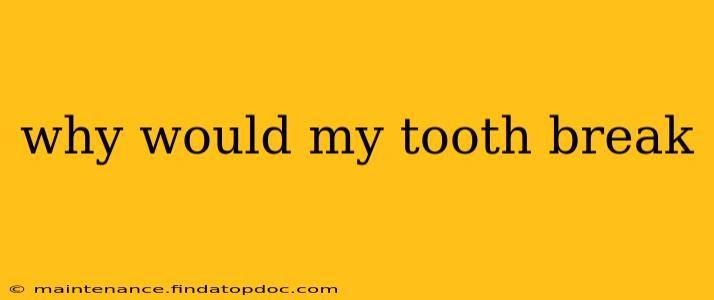Why Would My Tooth Break? Understanding the Causes of Tooth Fracture
A broken tooth is a painful and potentially serious dental problem. Understanding why your tooth might break is crucial for prevention and effective treatment. Several factors can contribute to tooth fracture, ranging from simple accidents to underlying dental conditions. This article will explore the common causes, helping you understand the potential risks and take proactive steps to protect your smile.
What are the common causes of a broken tooth?
This is a frequently asked question, and the answer isn't always straightforward. Several factors can contribute to a broken tooth, often working in combination. These include:
-
Trauma: This is the most common cause. Impacts from accidents, falls, sports injuries, or even a blow to the face can easily fracture a tooth. The force can cause cracks, chips, or complete fractures, depending on the severity of the impact.
-
Dental Decay (Caries): Extensive tooth decay weakens the tooth structure, making it more susceptible to fracturing under normal chewing forces. A large cavity can significantly compromise the tooth's integrity.
-
Bruxism (Teeth Grinding): Habitual grinding or clenching of the teeth, often done unconsciously during sleep, puts immense pressure on the teeth. Over time, this constant stress can lead to micro-fractures and eventually a complete break.
-
Weak Tooth Enamel: Thinning or weakened enamel, due to genetics, dietary factors (acidic drinks), or certain medical conditions, leaves teeth more vulnerable to chipping and cracking.
-
Large Fillings or Restorations: While fillings and crowns are designed to protect teeth, very large fillings or older restorations can weaken the remaining tooth structure, increasing the risk of fracture.
-
Internal Tooth Defects: Sometimes, teeth have inherent weaknesses or developmental defects that make them more prone to breaking. These defects might not be visible to the naked eye.
-
Dental Procedures: Although rare, some dental procedures, particularly those involving extensive tooth preparation, can sometimes increase the risk of fracture if not performed correctly.
How can I tell if my tooth is cracked?
Identifying a cracked tooth can be challenging as the damage might not always be immediately obvious. However, several symptoms can indicate a potential problem:
- Sharp Pain: A sudden, sharp pain, especially when chewing or biting, is a common sign.
- Sensitivity to Temperature: Increased sensitivity to hot or cold temperatures is another indicator.
- Pain When Releasing Bite Pressure: Pain that occurs when you stop biting down on your teeth suggests a possible crack.
- Visible Crack or Chip: In some cases, you can see a visible crack or chip in the tooth.
- Swelling or Discoloration: In severe cases, swelling or discoloration of the gums surrounding the affected tooth might occur.
What should I do if I think my tooth is broken?
If you suspect a broken tooth, seek immediate dental attention. Delaying treatment can lead to further damage, infection, and potential tooth loss. Your dentist will be able to diagnose the problem accurately and recommend the best course of action, which may involve:
- Bonding: For small chips or cracks.
- Crown: To cover and protect a significantly damaged tooth.
- Root Canal: If the crack extends to the tooth's pulp (nerve).
- Extraction: In severe cases where the tooth is beyond repair.
Can a broken tooth be prevented?
While not all tooth fractures are preventable, taking proactive steps can significantly reduce the risk:
- Wear a mouthguard: During contact sports or while sleeping if you grind your teeth.
- Maintain good oral hygiene: Regular brushing, flossing, and dental checkups are essential for preventing decay.
- Limit consumption of acidic foods and drinks: These can erode tooth enamel over time.
- Treat bruxism: Your dentist can recommend treatments like nightguards to reduce the impact of teeth grinding.
By understanding the causes of tooth fractures and taking preventative measures, you can help protect your teeth and maintain a healthy, beautiful smile for years to come. Remember, regular dental checkups are crucial for early detection and treatment of any dental issues.
